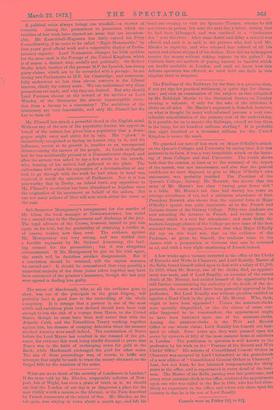A few weeks ago a vacancy occurred in the office
of the Clerks of Records and Writs in Chancery, and Lord Romilly, Master of the Rolls, found himself called upon to deal with a salary of £1,200. In 1850, when Mr. Berrey, one of the clerks, died, no appoint- ment was made, and if Lord Romilly, on occasion of the recent death of Mr. Murray, had availed himself of the opportunity for still further concentrating the authority of the heads of the de- partment, the course would have been generally approved in the profession. But Lord Romilly was without question entitled to appoint a Head Clerk in the place of Mr. Murray. Who, then, ought to have been appointed ? Unless the assistant-clerks were specially disqualified, or else the claims of some out- sider happened to be transcendent, the appointment ought to have been bestowed upon one of the assistant-clerks. Among the assistant-clerks in the Writ and Record Office is one whose claims Lord Romilly has himself not hesi- tated to admit. Some years ago they were pressed upon his notice by upwards of fifty of the most eminent firms of solicitors in London. The gentleman in question is well known to the profession by his work on the " Practice of the Record and Writ Clerks' Office." His scheme of Consolidated General Orders in Chancery was accepted by Lord Chelmsford as the groundwork of a new edition of " Consolidated General Orders in Chancery." Last, but not least, he has laboured irreproachably for thirty years in the office, and is experienced in every detail of the busi- ness. The Master of the Rolls, passing over this gentleman, and every other assistant-clerk in the office, conferred the appointment upon one who was called to the Bar in 1864, who has had abso- lutely no experience in the office, and whose sole claim upon his country is that he is the son of Lord Romilly.


































 Previous page
Previous page